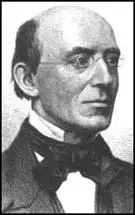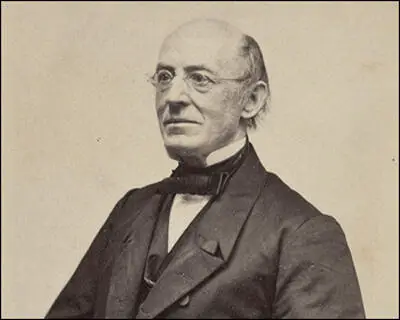William Lloyd Garrison

William Lloyd Garrison, the son of a seaman, was born in Newburyport Massachusetts, in December, 1805. Apprenticed as a printer, he became editor of the Newburyport Herald in 1824. Four years later he was appointed editor of the National Philanthropist in Boston.
In 1828 Garrison met Benjamin Lundy, the Quaker anti-slavery editor of the Genius of Universal Emancipation. The following year he became co-editor of Lundy's newspaper. One article, where Garrison's criticised a merchant involved in the slave-trade, resulted in him being imprisoned for libel.
Released in June 1830, Garrison's period in prison made him even more determined to bring and end to slavery. Whereas he previously shared Lundy's belief in gradual emancipation, Garrison now advocated "immediate and complete emancipation of all slaves". After breaking with Lundy, Garrison returned to Boston where he established his own anti-slavery newspaper, the Liberator. The newspaper's motto was: "Our country is the world - our countrymen are mankind" (an adoption of a comment made by Thomas Paine).
In the Liberator Garrison not only attacked slave-holders but the "timidity, injustice and absurdity" of the gradualists. Garrison famously wrote: "I am in earnest - I will not equivocate - I will not excuse - I will not retreat a single inch - and I will be heard." The newspaper only had a circulation of 3,000 but the strong opinions expressed in its columns gained Garrison a national reputation as the leader of those favouring immediate emancipation.
Garrison's views were particularly unpopular in the South and the state of Georgia offered $5,000 for his arrest and conviction. Garrison was highly critical of the Church for its refusal to condemn slavery. Some anti-slavery campaigners began arguing that Garrison's bitter attacks on the clergy was frightening off potential supporters.
In 1832 Garrison formed the New England Anti-Slavery Society. The following year he helped organize the Anti-Slavery Society. Garrison was influenced by the ideas of Susan Anthony, Elizabeth Cady Stanton, Lucretia Mott, Lucy Stone and other feminists who joined the society. This was reflected in the content of the Liberator that now began to advocate women's suffrage, pacifism and temperance.

Some members of the Anti-Slavery Society considered the organization to be too radical. They objected to the attacks on the US Constitution and the prominent role played by women in the society. In 1839, two brothers, Arthur Tappan and Lewis Tappan, left and formed a rival organization, the American and Foreign Anti-Slavery Society.
Garrison became increasingly radical and in 1854 he created controversy by publicly burning a copy of the Constitution at a Anti-Slavery rally at Framingham, Massachusetts. Although he doubted the morality of the violence used by John Brown at Harper's Ferry in 1859, his newspaper controversially supported his actions.
On the outbreak of the American Civil War Garrison abandoned his previously held pacifist views and supported Abraham Lincoln and the Union Army. However, during the war, Garrison was critical of Lincoln for making the preservation of the union rather than the abolition of slavery his main objective.
After the passing of the 13th Amendment in 1865, Garrison decided to cease publication of the Liberator. Garrison spent his last fourteen years campaigning for women's suffrage, pacifism and temperance. William Lloyd Garrison died on 24th May, 1879.
Slavery in the United States (£1.29)
Primary Sources
(1) William Lloyd Garrison, speech at Charleston, South Carolina (14th April, 1865)
In 1829 I first hoisted in the city of Baltimore the flag of immediate, unconditional, uncompensated emancipation; and they threw me into their prison for preaching such gospel truth. My reward is, that in 1865 Maryland has adopted Garrisonian Abolitionism, and accepted a constitution endorsing every principle and idea that I have advocated in behalf of the oppressed slave.
The first time I saw that noble man, Abraham Lincoln, President of the United States, at Washington, - and of one thing I feel sure, either he has become a Garrisonian Abolitionist, or I a Lincoln Emancipationist, for I know that we blend together, like kindred drops, into one, and his brave heart beats freedom everywhere, - I then said to him: "Mr. President, it is thirty-four years since I visited Baltimore; and when I went their recently to see if I could find the old Prison, and, get into my old cell again, I found that all was gone." The President answered promptly and wittily, as he is wont to make his responses: "Well, Mr. Garrison, the difference between 1830 and 1864 appears to be this, that in 1830 you could not get out, and in 1864 you could not get in." This symbolizes the revolution which has been brought about in Maryland. For if I had spoken till I was as hoarse as I am tonight against slaveholders in Baltimore, there would have been no indictment brought against me, and no prison opened to receive me.
But a broader, sublimer basis than that, the United States has at last rendered its verdict. The people, on the eighth of November last, recorded their purpose that slavery in our country should be forever abolished; and the Congress of the United States at its last session adopted, and nearly the requisite states have already voted in favor of, an amendment to the Constitution of the country, making it forever unlawful for any many to hold property in man. I thank God in view of these great changes.
Abolitionism, what is it? Liberty. What is liberty? Abolitionism. What are they both? Politically, one is the Declaration of Independence; religiously, the other is the Golden Rule of our Savior. I am here in Charleston, South Carolina. She is smitten to the dust. She has been brought down from her pride of place. The chalice was put to her lips, and she has drunk it to the dregs. I have never been her enemy, nor the enemy of the South, and in the desire to save her from this great retribution demanded in the name of the living God that every fetter should be broken, and the oppressed set free.
I have not come here with reference to any flag but that of freedom. If your Union does not symbolize universal emancipation, it brings no Union for me. If your Constitution does not guarantee freedom for all, it is not a Constitution I can ascribe to. If your flag is stained by the blood of a brother held in bondage, I repudiate it in the name of God. I came here to witness the unfurling of a flag under which every human being is to be recognized as entitled to his freedom. Therefore, with a clear conscience, without any compromise of principles, I accepted the invitation of the Government of the United States to be present and witness the ceremonies that have taken place today.
And now let me give the sentiment which has been, and ever will be, the governing passion of my soul: "Liberty for each, for all, and forever!"
(2) William Lloyd Garrison met Frederick Douglass soon after his escaped from slavery. In 1841 he recruited him as an agent for the American Anti-Slavery Society.
A beloved friend from New Bedford prevailed on Frederick Douglass to address the convention. He came forward to the platform with a hesitancy and embarrassment, necessarily the attendants of a sensitive mind in such a novel position. After apologizing for his ignorance, and reminding the audience that slavery was a poor school for the human intellect and heart, he proceeded to narrate some of the facts in his own history as a slave, and in the course of his speech gave utterance to many noble thoughts and thrilling reflections.
I shall never forget his first speech at the convention - the extraordinary emotion it excited in my own mind. I think I never hated slavery so intensely as at that moment; certainly, my perception of the enormous outrage which is inflicted by it, on the godlike nature of its victims, was rendered far more clear than ever.
It was at once deeply impressed upon my mind, that, if Frederick Douglass could be persuaded to consecrate his time and talents to the promotion of the anti-slavery enterprise, a powerful impetus would be given to it, and a stunning blow at the same time inflicted on northern prejudice against a colored complexion.
(3) Moses Grandy, Life of a Slave (1843)
When I first went to the Northern States, which is about ten years ago, although I was free as to the law, I was made to feel severely the difference between persons of different colours. No black man was admitted to the same seats in churches with the whites, nor to the inside of public conveyances, nor into street coaches or cabs: we had to be content with the decks of steam-boats in all weathers, night and day, - not even our wives or children being allowed to go below, however it might rain, or snow, or freeze; in various other ways, we were treated as though we were of a race of men below the whites.
But the abolitionists boldly stood up for us, and through them things are much changed for the better. Now, we may sit in any part of many places of worship, and are even asked into the pews of respectable white families; many public conveyances now make no distinction between white and black. We begin to feel that we are really on the same footing as our fellow citizens. They see we can and do conduct ourselves with propriety, and they are now admitting us in many cases to the same standing with themselves.
At that time, and ever since, we have had a host of American friends, who have laboured for the cause night and day; they have nobly stood up for the rights and honour of the coloured man; but they did so at first in the midst of scorn and danger. Now, thank God, the case is very different Mr. William Lloyd Garrison, who was hunted for his life by a mob in the streets of Boston has lately been chairman of a large meeting in favour of abolition, held in Fanueil Hall, the celebrated public hall of Boston, called "the Cradle of Liberty."


